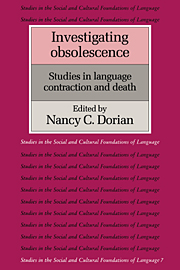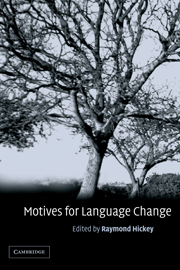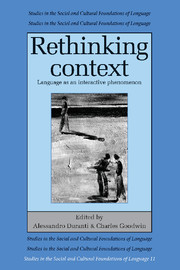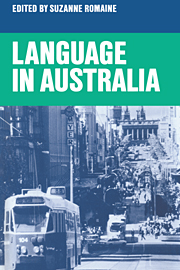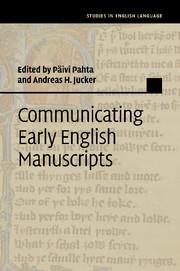Investigating Obsolescence
Languages die for political, economic and cultural reasons, and can disappear remarkably quickly. Between ten and fifty per cent of all languages currently spoken can be considered endangered, but it is only in the past ten years or so that due importance has been given to the study of contracting and dying languages. This volume represents the first attempt to give a broad overview of current research in a developing field, and to examine some of the crucial methodological and theoretical issues to which it has given rise. It includes twenty studies by scholars who, taken together, have worked on a range of languages currently under threat across the globe. They occur in diverse speech communities where the expanding languages are not only those that are very familiar - English, Spanish, or French, for example - but also Swedish, Arabic, Thai etc. The final part of the volume is devoted to a consideration of the implications of research into language obsolescence for other aspects of linguistics and anthropology - first and second language acquisition, historical linguistics, and the study of pidgins and creoles and of language and social process. As a whole, this collection will certainly stimulate further and better co-ordinated research into a topic of direct relevance to sociolinguistics and anthropological linguistics.
- Highly respected editor and contributors (American and European), several of whom are Press authors
- Interest in this topic growing,
- With broader coverage than older series titles, this book brings together concerns of anthropologists and sociologists in linguistics
Reviews & endorsements
"It is an interesting, provocative, and generally well-written book, and it is certainly time that we knew more about what happens to languages when they die....The book is very well planned, and suggests a model for other collections." Language
"It is only fitting that a preeminent pioneer in language obsolescence studies--Nancy Dorian--should be the editor of this impressive set of essays devoted exclusively to the topic of contracting languages....this data-rich collection of essays has succeeded in outlining the boundaries of a dynamic and relatively new arena of socio-linguistic research, has posed numerous, sometimes perplexing, questions about the very definition of 'a language' or 'a speaker,' has documented problems and trouble spots to beware of in carrying out research on contracting languages, has offered an inventory of traits--linguistic and social--that one may expect to encounter in such research situations, and has brought into relief both widespread and particular aspects of languages in retreat. I would expect it to become a classic text in this rapidly developing field of interdisciplinary research." Lenora A. Timm, Word
"In her preface Dorian states that the primary goal of the book is to put researchers interested in language death in touch with one another and to disseminate basic information about the field. As a valuable overview of research on dying languages, Investigating Obsolescence accomplishes these goals admirably....a fascinating piece of scholarship on many counts....It is both a stepping stone and a milestone--a stepping stone because it promotes the field's advancement by giving an overview of important research, a milestone because it establishes a more coherent agenda in a disparate and still emerging field." Carl S. Blyth, Anthropological Linguistics
"This well-documented book serves best as a starting point for further research. Recommended for academic and larger public libraries." Library Journal
Product details
July 1989Hardback
9780521324052
460 pages
234 × 152 × 34 mm
0.8kg
8 b/w illus.
Available
Table of Contents
- List of maps
- List of contributors
- Preface
- Introduction
- Part I. Focus on Context:
- 1. On language death in eastern Africa Gerrit J. Dimmendaal
- 2. The disappearance of the Ugong in Thailand David Bradley
- 3. Scottish and Irish Gaelic: the giant's bed-fellows Seosamh Watson
- 4. The rise and fall of an immigrant language: Norwegian in America Einar Haugen
- 5. Breton vs. French: language and the opposition of political, economic, social, and cultural values Lois Kuter
- 6. 'Persistence' or 'tip' in Egyptian Nubian Aleya Rouchdy
- 7. Sociolinguistic creativity: Cape Breton Gaelic's linguistic 'tip' Elizabeth Mertz
- 8. Skewed performance and full performance in language obsolescence: the case of an Albanian variety Lukas D. Tsitsipis
- 9. On the social meaning of linguistic variability in language death situations: variation in Newfoundland French Ruth King
- 10. The social functions of relativization in obsolescent and non-obsolescent languages Jane H. Hill
- Part II. Focus on Structure:
- 11. Problems in obsolescence research: the Gros Ventres of Montana Allan R. Taylor
- 12. The structural consequences of language death Lyle Campbell and Martha C. Muntzel
- 13. On signs of health and death Eric P. Hamp
- 14. Case usage among the Pennsylvania German sectarians and nonsectarians Marion Lois Huffines
- 15. Estonian among immigrants in Sweden Katrin Maandi
- 16. The incipient obsolescence of polysynthesis: Cayuga in Ontario and Oklahoma Marianne Mithun
- 17. Urban and non-urban Egyptian Nubian: is there a reduction in language skill? Aleya Rouchdy
- 18. Some lexical and morphological changes in Warlpiri Edith L. Bavin
- 19. Language contraction and linguistic change: the case of Welland French Raymond Mougeon and Edouard Beniak
- 20. Lexical innovation and loss: the use and value of restricted Hungarian Susan Gal
- Part III. Invited Commentaries:
- 21. Some people who don't talk right: universal and particular in child language, aphasia, and language obsolescence Lise Menn
- 22. Language obsolescence and language history: matters of linearity, leveling, loss, and the like Henry M. Hoenigwald
- 23. Language convergence and language death as social processes Kathryn A. Woolard
- 24. Pidgins, creoles, immigrant, and dying languages Suzanne Romaine
- 25. The 'up' and 'down' staircase in secondary language development Roger W. Anderson
- Bibliography
- Index of languages
- General index.

